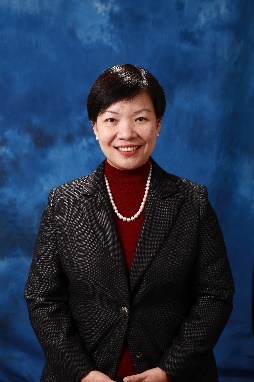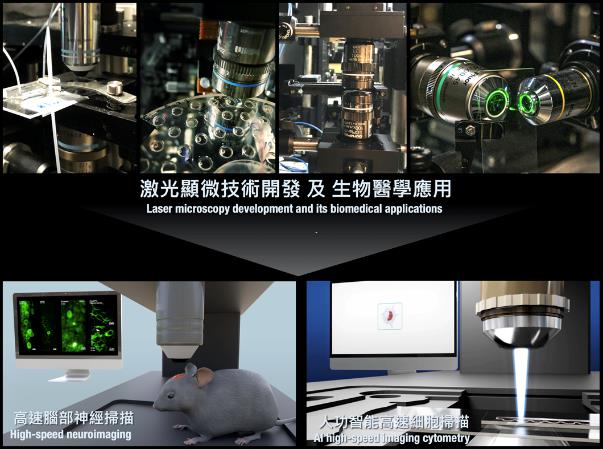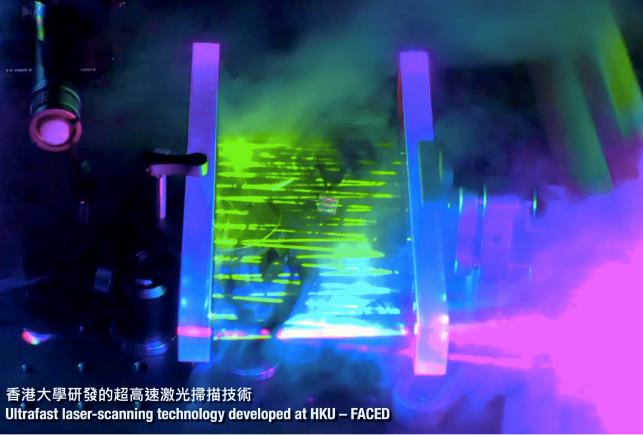Two leading scholars have been invited to deliver public lectures organized by the Research Grants Council. Details of the lectures are as follows:
| Topic | Speaker | Time |
|---|---|---|
| AI for Cognitive Health | Professor Helen Meng Mei Ling (Patrick Huen Wing Ming Professor of Systems Engineering & Engineering Management of the Chinese University of Hong Kong) |
10:30 am - 11:30 am |
| Decoding health and disease with high-speed laser imaging technologies | Professor Kevin Tsia Kin Man (Professor of the Department of Electrical and Electronic Engineering of the University of Hong Kong) |
11:30 am - 12:30 pm |
Venue: Lecture Theatre G/F, Hong Kong Central Library (Location Map)
Language: Cantonese
Admission is free and on a first-come, first-served basis.
Interested parties can also watch the live broadcast of the lectures through the Multimedia Information System of the Hong Kong Public Libraries via the internet (mmis.hkpl.gov.hk) for free.
If online participants would like to raise questions to the speakers, they can send email with the heading of “Questions for speakers” to rgc@ugc.edu.hk during the live broadcast of the lectures (10 April 2021 10:30am to 12:15pm). The questions will be passed to the speakers for feedback during Q&A session.
First Session
Topic: AI for Cognitive Health
Speaker: Professor Helen Meng Mei Ling
Date/Time: 10 April 2021 (Saturday) 10:30 am - 11:30 am
|
Brief introduction: Population ageing is a global concern. According to the World Health Organization (WHO), the number of people aged over 60 will nearly double to make up 22 per cent of the world’s population by 2050, while the number of Hong Kong people aged over 65 will rise to make up 35per cent of the local population. Neurocognitive disorders (NCD), which include various types of dementia – are particularly prominent in elderly people. As spoken language can be easily captured (even remotely) and enables sensitive cognitive assessments, Professor Meng’s team is developing Artificial Intelligence (AI)-driven technologies to automatically extract spoken language biomarkers for early detection of NCD. She will deliver a talk titled “AI for Cognitive Health” to share how AI-enabled healthcare contributes to better NCD management. This aligns with WHO’s plan of making dementia a public health and social care priority at national and international levels |
|
|
About the Speaker: Helen Meng is Patrick Huen Wing Ming Professor of Systems Engineering and Engineering Management at The Chinese University of Hong Kong (CUHK). She is the Founding Director of the CUHK Ministry of Education (MoE)-Microsoft Key Laboratory for Human-Centric Computing and Interface Technologies (since 2005), Tsinghua-CUHK Joint Research Center for Media Sciences, Technologies and Systems (since 2006), and Stanley Ho Big Data Decision Analytics Research Center (since 2013). Previously, she served as CUHK Faculty of Engineering’s Associate Dean (Research), Chairman of the Department of Systems Engineering and Engineering Management, Editor-in-Chief of the IEEE Transactions on Audio, Speech and Language Processing, Member of the IEEE Signal Processing Society Board of Governors, ISCA Board Member and presently member of the ISCA International Advisory Council. She was elected APSIPA’s inaugural Distinguished Lecturer 2012-2013 and ISCA Distinguished Lecturer 2015-2016. Her awards include the Ministry of Education Higher Education Outstanding Scientific Research Output Award 2009, Hong Kong Computer Society’s inaugural Outstanding ICT Woman Professional Award 2015, Microsoft Research Outstanding Collaborator Award 2016 (1 in 32 worldwide), IEEE ICME 2016 Best Paper Award, IBM Faculty Award 2016, HKPWE Outstanding Women Professionals and Entrepreneurs Award 2017 (1 in 20 since 1999), Hong Kong ICT Silver Award 2018 in Smart Inclusion, CogInfoComm2018 Best Paper Award and the 2019 IEEE SPS Leo L. Beranek Meritorious Service Award for exemplary service to and leadership in the Signal Processing Society. Helen received all her degrees from MIT. Her research interests include AI for speech and language technologies to support multilingual and multimodal human-computer interactions, eLearning and assistive technologies, as well as big data decision analytics using AI. Helen has served in numerous Government appointments, which include memberships in the Research Grants Council, as well as the Steering Committee of Hong Kong’s Electronic Health Record Sharing. Helen is a Fellow of HKCS, HKIE, IEEE and ISCA. |

|
Second Session
Topic: Decoding health and disease with high-speed laser imaging technologies
Speaker: Professor Kevin Tsia Kin Man
Date/Time: 10 April 2021 (Saturday) 11:30 am - 12:30 pm
|
Brief introduction: In the past ten years, laser microscopy has successfully made it permeated not only in biochemistry and cell/molecular biology research, but also in numerous preclinical and clinical applications. Professor Tsia will introduce the latest breakthrough in laser microscopy technologies developed at the University of Hong Kong in his talk titled “Decoding health and disease with high-speed laser imaging technologies”. These technologies include capturing high-resolution motion pictures of the swift-flying brain signals in a living animal; visualising the inner workings of biological cells and organisms in 3D without killing them; and detecting rare cancer cells among millions of blood cells. Not only can these technologies expand the realm of biological research (e.g. in neuroscience), but they will also create many new opportunities in cost-effective clinical diagnosis, especially cancer screening.
|
||
|
About the Speaker: Prof. Kevin K. Tsia received his Ph.D. degree at the Electrical Engineering Department, at University of California, Los Angeles (UCLA), in 2009. He is currently a Professor in the Department of Electrical and Electronic Engineering, and the Program Director of the Biomedical Engineering Program, at the University of Hong Kong. His research interest covers a broad range of subject matters, including ultra-fast optical imaging for imaging flow cytometry and cell-based assay; high-speed in-vivo brain imaging; computational approaches for single-cell analysis. His pervious researches, such as energy harvesting in silicon photonics and the World’s fastest optical imaging system, have attracted worldwide press coverage and featured in many science and technology review magazines such as MIT Technology Review, EE Times and Science News. He received Early Career Award 2012-2013 by the Research Grants Council (RGC) in Hong Kong. He also received the Outstanding Young Research Award 2015 at HKU as well as 14th Chinese Science and Technology Award for Young Scientists in 2016. His recent research on ultrafast optofluidic imaging technologies, dubbed “ATOM” and “FACED”, have also been covered by media and scientific magazines. He is author or coauthor of over 200 journal publications, conference papers and book chapters. He holds 4 granted and 3 pending US patents on high-speed optical imaging technologies. He is a co-founder of start-up company commercializing the high-speed microscopy technology for clinical diagnostic applications. |
 Laser micriscopy development and its biomedical applications, High-speed neuroimaging, AI high-speed imaging cytometry
Laser micriscopy development and its biomedical applications, High-speed neuroimaging, AI high-speed imaging cytometry
 Ultrafast laser-scanning technology developed by HKU - FACED
Ultrafast laser-scanning technology developed by HKU - FACED